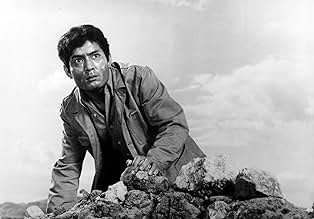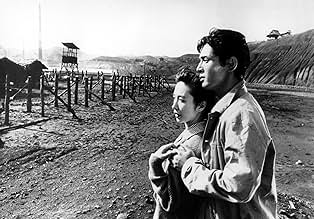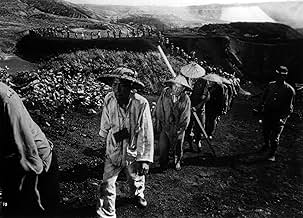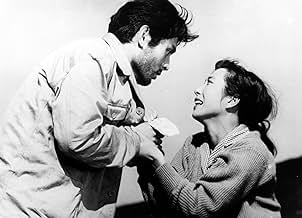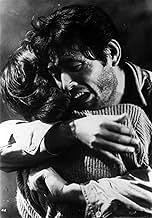La Condition de l'homme 1 - Il n'y a pas de plus grand amour
Original title: Ningen no jôken
IMDb RATING
8.5/10
10K
YOUR RATING
A Japanese pacifist, unable to face the dire consequences of conscientious objection, is transformed by his attempts to compromise with the demands of war-time Japan.A Japanese pacifist, unable to face the dire consequences of conscientious objection, is transformed by his attempts to compromise with the demands of war-time Japan.A Japanese pacifist, unable to face the dire consequences of conscientious objection, is transformed by his attempts to compromise with the demands of war-time Japan.
- Director
- Writers
- Stars
- Awards
- 5 wins & 1 nomination total
Kôji Nanbara
- Kô
- (as Shinji Nanbara)
- Director
- Writers
- All cast & crew
- Production, box office & more at IMDbPro
Featured reviews
10OttoVonB
Masaki Kobayashi's reflection on the Japanese experience in occupying Manchuria, fighting World War II, and dealing with defeat is a staggering piece of cinema. Clocking in at just under 10 hours, "The Human Condition" – what a title! – takes us on a journey with Kaji (Tatsuya Nakadai) through a POW film, a war film and a survival film, tied together by a loose love story, weaving all these strands together with great care over its epic but impeccably paced run-time.
The first part sees Kaji, a young, well-to-do Japanese, begin work as labor supervisor in a POW camp in occupied Manchuria. What could have been an interesting honeymoon with new loving wife Michiko and the start to a promising career slowly devolves into a nightmare: Kaji tries to stay true to his human principles while getting increasingly tangled in a complex web that involves escaping prisoners, abusive guards, and a tyrannical, bullish army that is above the law.
As an indictment of the Japanese Imperial Army, it is all the more haunting for coming from one who served under it. And to Kobayashi's credit, never does this come across as a crass moral lecture. It is a stunning, gripping study in mounting desperation, anchored by a powerful turn from the ever-dependable Nakadai.
Japanese cinema of this period has its quirks, stylish acting and a tendency to melodrama that can bemuse Western viewers. While I find Kobayashi less impaired by these traits than many of his contemporaries – especially in the cold, restrained anger and sorrow of Harakiri, his masterpiece – he gets heroic support from his star of choice. Far from the histrionics and bravado of a Toshiro Mifune, Japan's other megastar of the 50s and early 60s, Tatsuya Nakadai's magnetic charisma is far more subdued and heartfelt. Though our hero is at times unbelievably decent, perhaps buoyed by his youthful optimism and love for his wife, Nakadai makes every situation and painful decision resonate.
The technical credits are the usual for this under-appreciated director's work: arresting visuals, sweeping movement, carefully crafted sets. And the supporting players leave their mark, with a stand-out in each episode. In this instance, particularly Kaji's conflicted assistant, originally mistakable for a simple brute, finds very different ways of dealing with his own crisis of conscience.
This is definitely a film you have to see. Just make sure you clear your schedule, as you don't want to spread the viewing chunks too thin if watching in fragments
The first part sees Kaji, a young, well-to-do Japanese, begin work as labor supervisor in a POW camp in occupied Manchuria. What could have been an interesting honeymoon with new loving wife Michiko and the start to a promising career slowly devolves into a nightmare: Kaji tries to stay true to his human principles while getting increasingly tangled in a complex web that involves escaping prisoners, abusive guards, and a tyrannical, bullish army that is above the law.
As an indictment of the Japanese Imperial Army, it is all the more haunting for coming from one who served under it. And to Kobayashi's credit, never does this come across as a crass moral lecture. It is a stunning, gripping study in mounting desperation, anchored by a powerful turn from the ever-dependable Nakadai.
Japanese cinema of this period has its quirks, stylish acting and a tendency to melodrama that can bemuse Western viewers. While I find Kobayashi less impaired by these traits than many of his contemporaries – especially in the cold, restrained anger and sorrow of Harakiri, his masterpiece – he gets heroic support from his star of choice. Far from the histrionics and bravado of a Toshiro Mifune, Japan's other megastar of the 50s and early 60s, Tatsuya Nakadai's magnetic charisma is far more subdued and heartfelt. Though our hero is at times unbelievably decent, perhaps buoyed by his youthful optimism and love for his wife, Nakadai makes every situation and painful decision resonate.
The technical credits are the usual for this under-appreciated director's work: arresting visuals, sweeping movement, carefully crafted sets. And the supporting players leave their mark, with a stand-out in each episode. In this instance, particularly Kaji's conflicted assistant, originally mistakable for a simple brute, finds very different ways of dealing with his own crisis of conscience.
This is definitely a film you have to see. Just make sure you clear your schedule, as you don't want to spread the viewing chunks too thin if watching in fragments
The greatest film ever made! And I've seen many, many films. This even supercedes The Seven Samurai which I consider a masterwork. The Human Condition is 10 hours and in 3 movies. A stunning performance by Tatsuya Nakadai. Find the 3 parts, hie yourself off to a monastery and watch them, with a bit of a breather between each movie. Stroheim's Greed was about 10 hours before the Hollywood hacks cut it back. This one is intact. It is subtitled and not dubbed.
Masaki Kobayashi's dream project was the Human Condition adaptation, and he pulled it off as a brilliantly told and filmed epic that tells of a man trying to cling to his humanity in inhuman circumstances. All three films have wonders in various supporting performances and set-pieces that astound with their moments of poetic realism, and the sum of it all makes Lord of the Rings look like kid's stuff. In the case of the first feature on the trilogy, No Greater Love, we're introduced to and see the young, idealistic and essentially good-hearted Kaji (Tatsuya Nakadai) as he gets a job as a labor supervisor at a POW camp in Manchuria following an impressive paper presentation. He wants to do his best, but the 'powers-that-be', which include the stalwart boss and particularly the fascistic Kempeitai (army personnel on site), keep things always on edge with tension, and as new Chinese POW's roll in and he finds himself torn: how to keep production up of the ore while also not becoming a monster just like the other "Japanese devils" to the POW's.
While the story has an immediate appeal (or rather connection-to) the Japanese public as a piece of modern history- the occupation/decimation of Manchuria and its people- none of its dramatic or emotional power is lost on me. Kobayashi is personally tied to the material very much (he himself fought in the war and immediately bought the rights to the 6-volume series when first released), but he doesn't ever get in the way of the story. Matter of fact, he's a truly amazing storyteller first and foremost; dazzlingly he interweaves the conflicts of the prisoners (i.e. Chen, the prostitutes, Kao) with Kaji's first big hurdle of conscience at the labor camp as he sees prisoners treated in horrible conditions, beaten, abused, and eventually brought to senseless deaths thanks to Furyua and his ilk, and finds himself brought to an ultimate question: can he be a human being, as opposed to another mindless monster?
Kobayashi creates scenes and moments that are in the grand and epic tradition of movies, sometimes in beautiful effect and other times showing for the sake of the horrors of wartime (for example, there will never be as harrowing an exodus from a half-dozen cattle cars as seen when the Chinese POW's exit from there to the food sacks), and is able with his wonderful DP to make intimately acted scenes in the midst of wide scapes like the outside ore mines and the cramped living quarters or caves. And damn it all if we don't get one of the great scenes in the history of movies, which is when the six "escapees" are put to execution with the prisoners, and horrified Kaji, watching in stark, gruesome detail. Everything about that one scene is just about perfect.
But as the anchor of the piece (and unlike the other two films, he's not even in every scene of this part), Tatsuya Nakadai delivers on his breakthrough performance. Kobayashi needed a bridge between pre and post-war Japan, and Nakadai is that kind of presence. But aside from being an appealing star- the kind you don't want to avert your eyes from- he's mind-blowingly talented be it in subtle bits of business or when he has to go to town in explosive emotional scenes (or, also, just a twitch under his eye in a super-tense exchange). This goes without saying other actors right alongside him- Aratama, Yamamura, Manbara- are perfectly cast as supervisor, prisoner, prostitute, wife alike to Kaji. And yet, for all the praise worth giving to the film, one that gets even better in its second half than its first, this is only the first part!
While the story has an immediate appeal (or rather connection-to) the Japanese public as a piece of modern history- the occupation/decimation of Manchuria and its people- none of its dramatic or emotional power is lost on me. Kobayashi is personally tied to the material very much (he himself fought in the war and immediately bought the rights to the 6-volume series when first released), but he doesn't ever get in the way of the story. Matter of fact, he's a truly amazing storyteller first and foremost; dazzlingly he interweaves the conflicts of the prisoners (i.e. Chen, the prostitutes, Kao) with Kaji's first big hurdle of conscience at the labor camp as he sees prisoners treated in horrible conditions, beaten, abused, and eventually brought to senseless deaths thanks to Furyua and his ilk, and finds himself brought to an ultimate question: can he be a human being, as opposed to another mindless monster?
Kobayashi creates scenes and moments that are in the grand and epic tradition of movies, sometimes in beautiful effect and other times showing for the sake of the horrors of wartime (for example, there will never be as harrowing an exodus from a half-dozen cattle cars as seen when the Chinese POW's exit from there to the food sacks), and is able with his wonderful DP to make intimately acted scenes in the midst of wide scapes like the outside ore mines and the cramped living quarters or caves. And damn it all if we don't get one of the great scenes in the history of movies, which is when the six "escapees" are put to execution with the prisoners, and horrified Kaji, watching in stark, gruesome detail. Everything about that one scene is just about perfect.
But as the anchor of the piece (and unlike the other two films, he's not even in every scene of this part), Tatsuya Nakadai delivers on his breakthrough performance. Kobayashi needed a bridge between pre and post-war Japan, and Nakadai is that kind of presence. But aside from being an appealing star- the kind you don't want to avert your eyes from- he's mind-blowingly talented be it in subtle bits of business or when he has to go to town in explosive emotional scenes (or, also, just a twitch under his eye in a super-tense exchange). This goes without saying other actors right alongside him- Aratama, Yamamura, Manbara- are perfectly cast as supervisor, prisoner, prostitute, wife alike to Kaji. And yet, for all the praise worth giving to the film, one that gets even better in its second half than its first, this is only the first part!
In the World War II, the pacifist and humanist Japanese Kaji (Tatsuya Nakadai) accepts to travel with his wife Michiko (Michiyo Aratama) to the tiny Manchurian village Loh Hu Liong to work as supervisor in an iron ore mine to avoid to be summoned to the military service. Kaji, who defends communists principles, works with Okishima (Sô Yamamura) and he implements a better treatment to the laborers and improves the mine production.
When the feared Kempetai (The "Military Police Corps", the military police arm of the Imperial Japanese Army from 1881 to 1945) brings six hundred Chinese POWs to the mine, Kaji negotiates with their leaders expecting them to control their comrades. However the methods of Kaji upset the corrupt system in the site, and the foreman Furuya (Kôji Mitsui) plots a scheme to use the naive Chen (Akira Ishihama) to turn off the electrical power of the barbwire fences to allow the prisoners to escape.
When seven prisoners are falsely accused of an attempt of fleeing, a cruel Kempetai sergeant uses his sword to behead the prisoners. When Kaji protests, the POWs react sparing the lives of four prisoners but Kaji is arrested and tortured. When he is released, he is summoned to join the army and accused of being Red.
"The Human Condition – Parts I & II" is the anti-war masterpiece by Masaki Kobayashi. The story is impressively realistic and magnificently shot with top-notch camera work, giving the sensation of a documentary. I bought the box released by the Criterion approximately one year ago, and only today I have just watched the two first DVD with about 400 minutes running time. Tomorrow I will finish watching this masterpiece. My vote is ten.
Title (Brazil): Not Available
When the feared Kempetai (The "Military Police Corps", the military police arm of the Imperial Japanese Army from 1881 to 1945) brings six hundred Chinese POWs to the mine, Kaji negotiates with their leaders expecting them to control their comrades. However the methods of Kaji upset the corrupt system in the site, and the foreman Furuya (Kôji Mitsui) plots a scheme to use the naive Chen (Akira Ishihama) to turn off the electrical power of the barbwire fences to allow the prisoners to escape.
When seven prisoners are falsely accused of an attempt of fleeing, a cruel Kempetai sergeant uses his sword to behead the prisoners. When Kaji protests, the POWs react sparing the lives of four prisoners but Kaji is arrested and tortured. When he is released, he is summoned to join the army and accused of being Red.
"The Human Condition – Parts I & II" is the anti-war masterpiece by Masaki Kobayashi. The story is impressively realistic and magnificently shot with top-notch camera work, giving the sensation of a documentary. I bought the box released by the Criterion approximately one year ago, and only today I have just watched the two first DVD with about 400 minutes running time. Tomorrow I will finish watching this masterpiece. My vote is ten.
Title (Brazil): Not Available
This is an excellent film about one man attempting to change the system. Kaji brings his youthful enthusiasm, idealism, and humanism against a cruel, unjust machine. The acting, direction, and cinematography are all world class. This is a gripping film which will leave you yearning for part two. This is just the start of a stunning epic.
Did you know
- TriviaAccording to Tatsuya Nakadai, a marathon screening of the entire nine-and-a-half-hour "Human Condition" trilogy is held once a year in Japan, and he has once or twice attended these screenings, which are always sold out.
- GoofsAt one point a Japanese guard begins to whip Kao, yet the motions he makes are just a flailing of his arms, visibly missing the actor. Kao retaliates by throwing a rock at the guard, but the rock never strikes the guard. However, the actor playing the guard overreacts as if he has been struck.
- Quotes
Kuroki Shochô: You know, Kaji, theory may be correct and yet not always apply to reality.
Kaji: Then either the theory is wrong or it was incorrectly applied.
- ConnectionsFollowed by La Condition de l'homme 2 - Le Chemin de l'éternité (1959)
- How long is The Human Condition I: No Greater Love?Powered by Alexa
Details
- Release date
- Country of origin
- Languages
- Also known as
- The Human Condition I: No Greater Love
- Filming locations
- Hokkaido, Japan(Exterior scenes of the Manchurian mine)
- Production companies
- See more company credits at IMDbPro
- Runtime3 hours 28 minutes
- Color
- Sound mix
- Aspect ratio
- 2.35 : 1
Contribute to this page
Suggest an edit or add missing content


